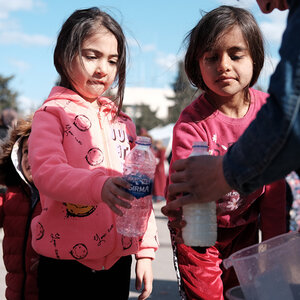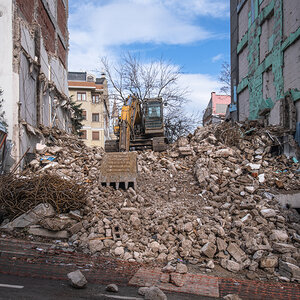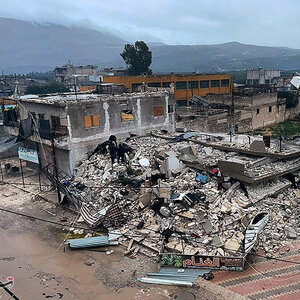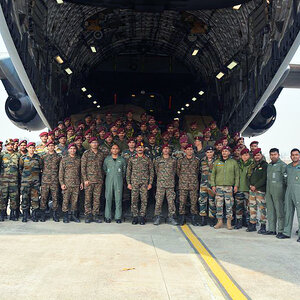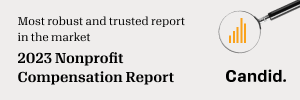Şenay Ataselim Yılmaz, Executive Director, Turkish Philanthropy Funds: Building trust and a connection to home
March 15, 2023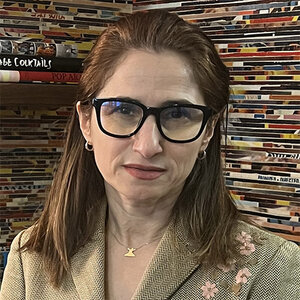
Dr. Şenay Ataselim Yılmaz has worked with the Turkish Philanthropy Funds (TPF) since its formation in 2007 and became its executive director in November 2020. Born and raised in Turkey, Ataselim received a bachelor’s degree from Ankara University before earning an MPA from Baruch College and a PhD from the Graduate Center of the City University of New York. Since 2016, she has been teaching fundraising and resource development as an adjunct professor at Fordham University.
TPF has been providing disaster relief and humanitarian aid since the earthquakes on February 6 that devastated southern Turkey and northern Syria, where more than 54,000 people have died and at least 1.5 million have lost their homes. As of March 14, the largest fundraising campaign in TPF’s 16-year history has raised more than $11.1 million from 40,000 donors and distributed more than $4.89 million in grants to local Turkish nongovernmental organizations (NGOs)—among the most consequential relief efforts for this earthquake by a public charity in the United States to date.
PND asked Ataselim about Turkish American philanthropy, the major gifts from Hamdi Ulukaya and Eren and Fatih Ozmen, and how the Turkish diaspora in the U.S. uses philanthropy to reconnect with communities back home.
Philanthropy News Digest: How has your workday changed since the earthquake hit on February 6?
Şenay Ataselim: We started fundraising at six in the morning on February 6, and everything has changed since then. Our staff are pulling 18-hour days just to respond to questions coming from donors, potential donors, from the larger community. But we also have a direct connection with our partners on the ground in Türkiye and are getting real-time information, so we are also following all that very closely. What’s happening? Who's doing what? And that communication is ongoing, 24 hours a day. We have also stopped everything else we do at Turkish Philanthropy Funds, because we’ve told our donors that 100 percent of donor contributions will be sent to our partners on the ground, those who are responding to the earthquake, and that requires more than 100 percent of our staff time. Everything we do right now is related to earthquake relief efforts.
And we are five people, a very small team. I have a dedicated and committed board of directors who are very hands on, especially during this disaster. They rose to the occasion and have been providing a lot of support. We have a dedicated team of volunteers, and they are helping with many different issues and challenges.
PND: You mentioned communication with NGOs and people on the ground in Turkey. Can you tell us about your networks and relationships across Turkish civil society and how that informs your work?
ŞA: TPF is part of an initiative in Türkiye called Afet Platformu (Disaster Platform), which was established in 2020, after another earthquake in Elazig in the eastern part of the country. The goal was to bring together NGOs and other stakeholders onto a common platform, so that when a disaster happens, we can all coordinate and respond quickly in an efficient, effective way. The Disaster Platform has been a great collaboration. With all these organizations working together, things become much easier. They also help us with our decision making [including] daily calls at 10 or 11 p.m. [in Türkiye] to really try to understand what the issues on the ground are, so that resources can be directed to solve problems. Once you know what’s really happening on the ground, you review grant applications with that information in mind and make better decisions.
Over the years we have also built a large network of more than 70 organizations—that’s how we receive our information from on the ground. Some are working directly in the earthquake-affected region, responding to relief efforts, while others are outside the earthquake zone but serving communities from the affected region. We’re working with our partners, trying to understand what the issues are, where the needs are, who’s doing what.
PND: You’ve already raised more than $11 million for earthquake disaster relief, far and away your most successful campaign. Can you share some highlights as to who your contributors are and where the funds are being distributed?
ŞA: Most of our donations are coming from donors in the United States, but we’re receiving donations from all over the world. It was the same with our 2021 campaign to address the wildfires in Türkiye. When there’s a disaster and there’s a credible, transparent organization raising money, people trust you, and they make donations. More than 40,000 people have contributed to our latest campaign. The average donation is $250, so while we have really big donors, we also have small donors, so truly this is a community effort. Everyone gave and they continue to give.
The entire Turkish American community has come together to do address this disaster. People are not only making contributions to our campaign but are also reaching out to their networks to gather support and help us get the word out. I would like to underline that, because this earthquake has been very difficult for our community and being away from home is also very difficult, this has become a way for them to connect back home. TPF is not only providing people a platform so they can give to organizations in Türkiye, we are also giving people a chance to connect back home, and they understand that. Especially during disasters, giving back becomes a very personal matter, and we work with our donors to help them with that.
Donors come to us saying they know of a specific need because they have relatives, family, friends, and they want specifically to provide support directly to them. We cannot, unfortunately, support individual efforts like that, but we connect them to an NGO on the ground that can. Donors also come to us wanting to address a specific issue in a specific community, because, for example, they’re from that city, and we work with them to raise funds from their networks here in the United States so the support can be channeled—again through local NGOs—to make it happen. That personal touch, I think, makes our efforts truly a community effort and makes a difference for a lot of our donors; it allows them to feel like they are connecting to people in need by giving and responding even though they cannot be there in person.
TPF is not only providing people a platform so they can give to organizations in Türkiye, we are also giving people a chance to connect back home, and they understand that. Especially during disasters, giving back becomes a very personal matter.
PND: What kind of support and relief is TPF providing?
ŞA: So far, we have distributed $4.89 million to 37 organizations in 11 cities. Most of the efforts are around disaster relief efforts. Right now, we have given grants to support distribution of food and water, and we are working with organizations that provide psychosocial support to earthquake survivors. We are hearing that there is a huge need for psychosocial support, not only in the earthquake region but all around the country, since 2.2 million people have already left the disaster zone and moved to other parts of Türkiye.
We are also providing humanitarian cash assistance, especially to students [totaling more than $1 million to date]. That’s the path easiest to access, right now, and that cash also helps the families of those students. We have worked with organizations distributing dignity kits and hygiene kits and provided generators and medical support, including care for cancer patients in the region. We have also supported the establishment of a children’s earthquake rehabilitation center [a $500,000 collaboration with Çukurova University]. There is so much death, but there are also those who have had limbs amputated—we have had reports of hundreds of children who have had amputations—so we are providing short-term medical support, but also long-term rehabilitation needs for them.
PND: Are people getting the help that they need? What has surprised you the most as the relief effort unfolds?
ŞA: This is a major disaster that impacted 11 cities in Türkiye. To give you a sense of how big that is, it’s an area from Boston to Washington, D.C. The first few days were not easy for the first responders and volunteers. More than 14 million people were affected. As I said, 2.2 million people have left the region, and more than 200,000 buildings have been identified as heavily damaged and need to be demolished, leaving so many people homeless. But there are really great things happening. The whole country is working together to provide support. There’s a program called “One Rent, One Home” which matches homeowners offering their houses to earthquake survivors in need of shelter; hotels have opened their doors; university dorms are being used. It’s a whole-country effort.
PND: Are we in a place where we can begin to talk about reconstruction and the rehabilitation of communities, or are we still focused on immediate disaster relief?
ŞA: Both need to go hand-in-hand as we continue to provide support for the immediate emergency response. We have been conducting a detailed assessment and evaluation of the situation to look at what is going to be needed in the mid- to long term. Our staff is talking to our partners on the ground, to experts, and reaching out to donors and have identified a couple of priorities. The first is economic development. We’d like to see cities in the region rebuilt and want to provide financial assistance to entrepreneurs and businesses to help them access new markets. There are a lot of local agricultural producers in the region, so we want to be able to give them a chance to help local economies recover and thrive.
The other is creating safe spaces for children and youth, both in the earthquake region and in other parts of the country with affected populations. Our focus right now is on protecting girls ages 14 to 18 [including more than $94,000 to Turkish Family Health and Planning Foundation]. We are hearing that almost 60 percent of the region’s schools where damaged, so there’s going to be a huge need around education. Our team is working with partners to identify how we can get schools back up. We want to support student learning and programs that strengthen employability and school to work transitions for youth.
As I mentioned, there are a lot of individuals that are recovering from amputations as well as people pulled out of the rubble that will need a lot of medical support, and we want to ensure their access to health care, rehabilitation, adaptive technology, and community-based services to get them going.
Psychosocial and mental health is also an area we believe is going to need major investment in the mid- to long term, as individuals cope with the emotional and psychological trauma of the earthquake. Lastly—I think this is really important for everyone in Türkiye and something we’d like to bring people together on—because Türkiye is an earthquake-prone country, we need to build resilience in those communities that are on major fault lines by supporting preparedness and disaster risk reduction efforts.
[B]ecause Türkiye is an earthquake-prone country, we need to build resilience in those communities that are on major fault lines by supporting preparedness and disaster risk reduction efforts.
PND: You’ve partnered with Giving Pledge signatory Hamdi Ulukaya and Eren and Fatih Ozmen, each providing both $1 million in direct aid and an additional $1 million in matching funds. How did that come about, and what work did you do in terms of relationship building and visibility in the Turkish American community that made TPF a key philanthropic partner for contributions large and small?
ŞA: Both Eren and Fatih Ozmen and Hamdi Ulukaya are longtime donors to TPF. Hamdi Ulukaya was one of the first donors who came to us on February 6 and asked: “What can I do?” Within hours he increased his initial gift of $1 million to $2 million, fueling our efforts with a matching gift, and that match was gone in a day. Of course, his name brought a lot of additional donors to TPF, then Eren and Fatih Ozmen joined forces with him, making another $1 million donation with an additional $1 million matching gift. And that brought even more people to the campaign. Their leadership, commitment, and dedication has been very important for us, and it’s really making a difference. They are inspiring others to take action.
Besides those large contributions, there are other factors helping our efforts. Our commitment to giving 100 percent of donations to local NGOs working on the ground has triggered a vigorous response from our community, as did our making it easy for people to give online. Both have had a huge impact on the amounts raised. We also leveraged our relationships with Turkish American organizations and many of them either started their own campaign with us or raised funds among their members, then passed it to us. All this is possible because we have a record of channeling our community’s funds in the most transparent and efficient way to our partners in Türkiye. The Turkish American community’s trust was not easily won, but now it has made all the difference.
Our donors have also become our biggest ambassadors. That has meant free advertising space on taxis in 15 cities across the U.S., free advertising space on billboards, including Times Square. They have also added TPF to their company’s list of recommended charities supporting relief efforts—something that, in the past, was not so easy to do. They have even been hanging flyers in their businesses—that added support has really made a big difference.
PND: Is there a growing philanthropic consciousness in the Turkish American community? Is there something different in how the Turkish American community sees itself and its relationship to Turkey?
ŞA: I don't think it’s a behavioral change; I think the times have changed. First, it wasn’t that easy to give to Türkiye 10 years ago. There weren’t that many platforms and there were no networks to work through. People living in the U.S. always wanted a vehicle, a channel, an organization that they could trust to give to Türkiye. When TPF was started in 2007 we were not that well known in the community and trust takes time to build. Second, civil society in Türkiye is much more robust than it was a generation ago. There are so many great local organizations, and they are doing great work. We see one of our roles as introducing their work to our donor community in the U.S. and creating that connection. That makes giving back to Türkiye easier, and that’s why we are seeing the numbers growing.
We believe that disaster relief and rebuilding efforts should be locally led, because the local community is affected by the disasters, and they are in the best position to understand their own needs and challenges. That’s how we approach our grantmaking, and we believe local communities need to be empowered so that they can lead the response and recovery efforts. As organizations come to us, we encourage them to partner with local organizations, so that we can build community resilience, promote community ownership of the recovery process, and ensure that resources are directed to where they are needed most.
We believe that disaster relief and rebuilding efforts should be locally led, because the local community is affected by the disasters, and they are in the best position to understand their own needs and challenges. That’s how we approach our grantmaking, and we believe local communities need to be empowered so that they can lead the response and recovery efforts.
PND: You were born in Turkey, were raised there, and went to college there, and then you came to the U.S., where you focus on Turkish philanthropy. Can you reflect on that experience and how it influences your work?
ŞA: I generally feel like I'm torn between two cultures, like I have two homes. The United States is my adopted home. Türkiye is my childhood home, so when I’m asked where I’m from, I struggle to answer. I feel like I belong to both worlds, and I am lucky in the sense that my job enables me to provide a platform for people like me who want to connect back home while being present here. I’m a graduate of the Political Science Faculty of Ankara University. The school has many high-achieving alumni who go to work in the public sector and government. They become the minister of foreign affairs, they become bankers. I did not see any of that as a good fit for me, but I knew I wanted to make a difference in the world. Honestly, I didn’t know much about civil society back then, and in any case, it was not much developed in Türkiye at the time.
I came to New York to get my master’s in public administration, studying nonprofit management and public policy, then a PhD in political science. The education I received in the U.S. was an eye opener, when I learned about nonprofits and philanthropy—I simply did not know about that world at all. Until I came to the U.S., I didn’t have any real knowledge of what difference an individual can make through philanthropy.
Giving back is a big part of Turkish culture, but it’s done very informally—that’s how I grew up. But my U.S. education showed me that philanthropy can also be done strategically. My graduate work in New York led me to study the Turkish diaspora community in the U.S., to understand what motivates their giving. In helping create TPF, I learned that philanthropy is an extension and embodiment of our values. Both my homes, Türkiye and the U.S., have made me who I am and guided my giving. I think that’s true for all Turkish Americans, for all immigrants. With that in mind, we work with our donors and guide them toward a path that creates long-term positive impact back home, but in a way that is also personally satisfying and satisfies that need for a connection to home. That’s the uniqueness of Turkish philanthropy.
— Daniel X Matz


